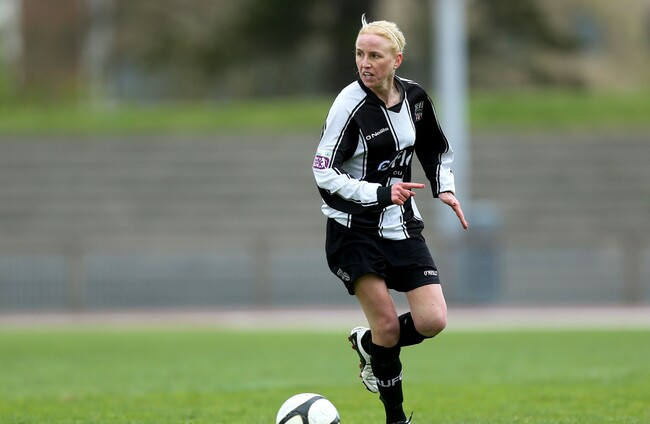Updated at 10.44
CAROLINE THORPE CANNOT imagine what life without football would have been like. It has given her so much, and it has also hurt her unduly.
The former Ireland international’s talent for the beautiful game resulted in opportunities that otherwise would not have come her way.
It was also primarily football that, the 38-year-old Dubliner believes, rescued her at her darkest point.
Growing up, she idolised her older brother, following him to games. Coming from a “disadvantaged” area, she saw football as a form of escape. “It was either one way or the other,” she tells The42. “You either went and did something with your life, or you went the other way.”
She had no money, so famed youth football coach Brother Bernard Twomey was an early patron. “I couldn’t afford to travel but money was never an issue with him. One thing I’m so grateful to him for is that he would always recognise that very early with people and would never ever mention it. Even with the likes of subs and all that, I just couldn’t afford it. I couldn’t get money. And he never would ask for it.”
As a teenager, Thorpe’s big break came during an Ireland match down in Arklow. Both the Arsenal and Fulham managers, who were in attendance, wanted to sign her on the back of the performance.
Fulham were a full-time outfit, but Thorpe ultimately opted for the Gunners owing to the large Irish contingent there — Yvonne Tracy, Emma Byrne and Ciara Grant among others played for the club in that era, while she would also regularly encounter stars like Patrick Vieira, Denis Bergkamp and Arsene Wenger there.
Yet life in London was barely manageable. Despite a brilliant debut in which she scored a brace against Tranmere, off the field she was being bullied constantly by a team-mate and admits to being “afraid of her”.
“She bullied me for a year and I couldn’t get out of there quickly enough when the season ended. It was the worst decision football-wise for me, but the best decision as a person. I don’t think a whole lot of people know that about my career. I wasn’t going back when she was there.”
On the pitch, Thorpe was “like a demon possessed,” but off it she acknowledges she was “too soft,” with certain people duly taking advantage. Others knew the bullying was taking place, but were similarly intimidated by the player in question and “afraid to say anything”.
You think you’re the problem,” she adds. “You were afraid to open up about it and [as a teenager], I didn’t have any real support. I was on my own and I didn’t want to be ringing home and telling them I was being bullied. I had to make out I was having a great time. [The football] kept me sane. Other than that, I became a recluse really. I wouldn’t go out much with them or anything like that, because I was depressed.”
Remarkably, despite all the difficulties in the background, Thorpe was part of a squad that won the domestic treble. She wasn’t a regular and was perceived more as a promising player for the future, often coming off the bench.
But the bullying ultimately proved overwhelming. Thorpe linked up with St Catherine’s in Dublin briefly, before signing for Leeds, after some encouragement from international team-mate Claire Scanlon, who was also joining the club. They had just been promoted to the top flight and were a decent side, but not on Arsenal’s level.
***
Thorpe later took in short stints at UCD and St Catherine’s in 2004, before making the surprise call to quit football while still in her early 20s.
A guy she had met was moving to Vietnam and she had decided to join him, but there was another unspoken reason for leaving the game behind.
“I couldn’t get away from football quick enough,” she recalls. “The reason being is, this is huge in my life and still is, a significant thing happened when I was away on an Ireland trip.
“We were walking around the street after winning a match. I think it was 6-0 or some stupid score, playing some country who couldn’t kick a ball.
“I was with an experienced player. She was going on about how she was getting old, ‘don’t know how many years I have left’. [Someone else] was like: ‘Ah, would you stop? You have loads of years left in you.’ She said: ‘I’d love to be like Calo there.’ She meant in terms of age, because I was young.
“And [the other person] turned, looked at me, made a gesture and said: ‘What? Like that!’ And that comment ruined my life.
From that, I immediately just lost it in terms of self-confidence. Everything affected me. It affected my football. I developed an eating disorder fairly quickly. I didn’t want to be in [that person's] company, because I was afraid they were going to comment on me physically.”
Thorpe recently came across the veteran player who was there when that inappropriate comment was made.
“I said to her: ‘We both know very clearly that I have an eating disorder.’ She said: ‘I know exactly when that started.’ I couldn’t believe this. And this is the first time that I knew someone else knew of this moment. She said to me: ‘It was that time we were away, walking down the street.
“What I wanted to say to her right there and then was: ‘Why didn’t you help me?’
“I don’t want to sound bitter and I’ve no hard feelings towards anyone about it. But it was my life and to be honest, if I did have a chance to change it and have a different life, I probably would say: ‘No.’ It has made me who I am.”
She continues: “The [hurtful] comment was about my appearance. I wasn’t fat, but I was chunky, I was strong.
“If we had that conditioning back then, instead of being chunky, I would have been lean and strong, and probably athletic. Back then, it just wasn’t that way.
“So that comment more or less destroyed my life for the last 20 years.”
Thorpe bears no ill will towards the individual who made the throwaway comment and believes they had no idea of the impact of what they said.
She spent the next few years abroad. In addition to Vietnam, she also spent time in Bulgaria and Spain.
Throughout this period, Thorpe was in a toxic relationship with a boyfriend, which would do further harm to an already poor self-image.
With the eating disorder intensifying, Thorpe was a different person mentally and physically by the time she returned to Ireland.
Yet having gone out of her way in order to avoid playing or having anything to do with football on her travels, she was promptly convinced to get back into the game.
She took in stints at St Catherine’s, Shamrock Rovers, Peamount and Raheny. She produced a player-of-the-match performance for the latter as they beat Castlebar 3-2 in the 2013 FAI Cup final. The occasion was made more poignant due to the fact that one of her brothers had recently passed away.
But despite an accomplished display on the pitch, off the field, she was struggling badly. “If you see pictures of me, I’d be quite thin. Every game that I played, I probably would be playing without any food, which when I think about it, is unbelievable, to be able to do something like that and play at that level.”
****
After a succession of serious injuries, Thorpe retired from senior football around 2015. Yet she was to have another life-changing moment, pertaining to soccer, which took place only last May. As part of a fun-filled weekend, herself and Olivia O’Toole were among those invited down to Shannon for an Ireland Legends game.
“I was down there on Friday night. Myself and Ronnie Whelan were just there. The rest were coming the next day.
I went down there on the Friday night and long story short, Ronnie Whelan was like: ‘Do you want a drink?’ I said: ‘I don’t drink. I’ll have a water.’ I ended up saying to myself: ‘This is Ronnie Whelan. Just go and enjoy it.’ I ended up getting pissed.
“I was still drunk when I woke up the next morning — I’m not going to lie, I never played as bad in my life, which I still give myself a lot of grief over. I was saying to the lads: ‘I swear, I’m not that shit [at football]. I’m actually alright.’”
Thorpe pauses and hesitates, before saying: “I’ll go back one.”
She then adds additional context to the Whelan story: “The week before, I had hit rock bottom. I had a breakdown in work with my boss. It was to do with the eating disorder. I basically got to a stage where I couldn’t keep a grape down, I was getting sick.
“Everything else in my life was going really well. Work, college, my boyfriend, everything was falling into place and this one thing was holding me back, but it’s huge in my life.
“I had applied for a psychology degree in Dublin Business School to start in September just gone. The reality of it was, when I started that [I thought] that I’d probably be dead by the time it was finished. That’s how bad my body was physically.
“I was getting help through work. They were setting me up with a counsellor. The week before the match, I had decided in my head that I was going to take my own life. I had it in my head that I was going to do it down in Clare, because I didn’t want to do it in Dublin. I just thought I’m away from everybody, I can do it then. I did think this. I had nothing set in stone as to how I was going to do it.
I had my first counselling session, just before I was going down, in Cork. [One of the organisers] basically said: ‘Come down on the Friday if you want.’ I went to that counselling session, which did nothing for me at the time. I’d made up my mind as to what I was going to do. I left the counselling session and I was driving around Cork, thinking: ‘This is the last weekend.’ All this shit.
“So I went down [to Clare] anyway and I didn’t expect what happened to happen, I suppose, regarding the whole Ronnie Whelan thing. What changed my life was deciding: ‘I’m just going to have a laugh. I’m going to enjoy this weekend. I’m going to enjoy myself right now. I’m having a drink here with Ronnie Whelan: who gets to say that?’ So I did. And I got pissed. And I had such a laugh.
“So the Friday just rolled into the Saturday, because I was dying sick coming down the next morning. All the others were turning up, and Ronnie Whelan’s telling them all, saying: ‘And guess who comes down from Dublin, saying: no, I don’t drink.’ And I got pissed drinking shots and all. He had made a big story out of it. So it was a good laugh.
“We went to play the match and I was totally shit, because I got too drunk, which was really bad. Then we just went back to the hotel and started drinking again. I was up until seven o’clock the next morning. No pressure, no nothing, just being able to enjoy whatever it was. I loved it. And it gave me a taste of what things could be like if I was happy.
So from that then, I decided: I really want to get better here. I really want this to go my way. I want to live. I want to have great times with my boyfriend. I do not want to live my life that’s driven by this addiction, or this psychiatric hellhole that I’m in, with the eating disorder. It is a disease of the mind. It’s like any other addiction. It’s a coping mechanism, or whatever you want to say it is.
“The more things got worse, the more I delved into it, and the more I was physically dying, and killing my body. That was the reality of it.
“There are a couple of pictures I have that show what I was like that weekend — how thin I was. I don’t mind them being used in the article if they help somebody. I took a couple of pictures of me in the gym [more recently], and there’s a difference — you’ll see it.
“But from that moment, I decided that I wanted more of those times, whether it happens to be football, it didn’t matter what it was. I wanted to feel that feeling of ‘I don’t give a shit.’ For this one time in my life, the eating disorder is not going to dictate what I do or what I am or whatever. I had the best time of my life down there, so I decided that I wanted to get better.”
Unfortunately, the drama didn’t end there. Having visited the doctor one day and had a substantial amount of blood taken from her as part of tests, she then started to feel unwell.
“[A few days later] I got a phone call from that doctor saying you need to get yourself to hospital now. Your potassium is so low that your heart could stop any minute now. You need to do something about that.”
Thorpe was in work at the time on her own. She decided to wait a few hours before a colleague came in, and it was then she exited after saying she had to go to the hospital (aside from her boss, none of her colleagues were aware of the extent of her illness).
It was 11pm before Thorpe was treated, having arrived at 3pm. She was starving but “afraid to eat”. She didn’t want to worry her family or friends by telling them where she was.
After being put on an IV line, it was only then that Thorpe was told she would be spending days rather than hours at the hospital.
I was bullimic. So if I ate anything I’d get sick. So I was hungry. With the eating disorder, something in me was saying: ‘We need to leave, we need to go. This isn’t in our plans.’
“So I had to check myself and say: ‘No, I want to get better. This is my opportunity. It’s now or never.’”
The next morning, Thorpe took another step towards recovery, ringing her parents and speaking openly about her issues. She feels eternally grateful to family and friends, in addition to the staff at various institutions, for their crucial support in aiding her recovery.
The doctor remained concerned, however: “She said ‘you’re going to have to eat something, because you’ve literally depleted your whole body of all your vitamins and minerals and everything.’ She said: ‘I don’t know how you’re even still alive.’
I was just over 40 kilo at the time in the hospital. She kind of said ‘you have to eat, even little bits’. I said: ‘Listen, you don’t know how bad I want this, I’m sure you hear it all the time, but I want to get better and I mean it.’ I said: ‘I’m literally going to eat everything you give me, no matter what it is. I’m going to eat it all.’ And she was just looking at me.
“But I’d made that decision in my head that that’s what I was doing and I did it. I ate and I’m still eating. So I’ve definitely come a long way in the last few months. I’m proud of that. And I’m constantly going to different support groups. So I’ve my life back somewhat.
“I was thinking when you asked me did I want to do this that this would be my story, what I’ve gone through. This is the message that I would like to give to other girls — no matter how bad you are, or how bad it gets, you can be happy again and you can have that. It is ultimately what I want to do. I want to help others who are going through stuff that no matter what they’re trying to do as their coping mechanism, I know their thoughts and I can relate to them so much that I can help them — and that is what I want to do. That’s where I’m at today. I’m going to go back to college to get that degree.”
Need help? Support is available:
- Bodywhys, the Eating Disorders Association of Ireland. Read more here.
- Marino Therapy Centre. Read more here.
- Samaritans 116 123 or email jo@samaritans.ie
- Aware 1800 80 48 48 (depression, anxiety)
- Pieta House 1800 247 247 or email mary@pieta.ie (suicide, self-harm)
- Teen-Line Ireland 1800 833 634 (for ages 13 to 19)
- Childline 1800 66 66 66 (for under 18s)


















Well done Katie
She did great . The German girl was no pushover but Katie made it look easy. She’s the real deal. Commentators were talking about the current champ being 40-1 but I bet Katie smokes her. Maybe One or two more warm up fights but Taylor is ready right now !
Go on you good thing
Great performance. Very relaxed and was in total control. Class act Katie
Congrats Katie onward and upward,the greatest Female boxer of all time is there
Champ! Go on katie. To do this on such a big stage too!
By far our most successful sports person ever
@Cian Morris: Two world titles in a pro sport beats it.
@Cian Morris: stop stop
@Gary: An Irish sportsperson who I always feel is massively underappreciated by many Irish people is Padraig Harrington. Not many golfers out there win a major let alone 3.
Cian will you get off the wine.
@Cian Morris: Sean Kelly….. google him if you have too.
@ML: Golf isn’t a sport. It’s a Game
Ah Ryan will ya stop trolling or stop joining Cian for the Buckfast.
@Eric Djemba-Djemba: you call yourself eric djemba djemba that is all
@Cian Morris: she’s not even our most successful pro boxer yet. So maybe a little quick off the mark there.
Great stuff Katie a lot more relaxed than the last night.dublin the 02 is calling
Legend
Maith an cailin
Stop stop